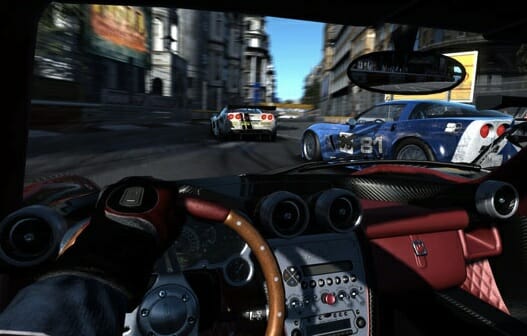
Developer: Slightly Mad Studios
Publisher: Electronic Arts
Platforms: Xbox 360, PS3, PC
What happens when the world realizes it doesn’t need so much speed after all?
Though not struggling as spectacularly as the American auto industry, the long-running Need for Speed series has steadily lost ground to competitors. Recent installments feel tired and passé, especially when played alongside more inspired games like Burnout Paradise. Aimless circling is a vital part of any racing simulator, but that shouldn’t apply to a game’s own past.
Need for Speed: Shift breaks from this wayward trajectory. Instead of pumping out another slightly altered iteration in the face of increasing critical and commercial indifference, Electronic Arts has hit the garage and overhauled the venerable arcade-style racer. Shift veers into simulation territory, with a focus on European-style racing on tracks both real and fictional. The police chases and overheated full-motion video cutscenes of past Need for Speeds are out; realistic handling and cockpit views are in.
Also in, of course: cars, and lots of them. Not just those crazy foreign racecars with names like soccer players, but solid, God-fearing American automobiles like the Camaro and the Ford Focus. You can even relive the excitement of your first car and drive the modest, yet sensible, Honda Civic. I am no transportation fetishist, but I can’t deny the affection I’ve developed for my souped-up Volkswagen Golf. I’ve tweaked that lime-green and vermillion beauty out to the point where it can hold its own against the Pagani Zonda, which is apparently a car and not an Italian midfielder. Car customization options unlock in tiers as you progress, allowing you to upgrade the same entry-level vehicle to a high-performance speed demon. The improvements are realistic, with nary a machine gun or jet rocket in sight. Long after you’re bored with racing you’ll still love expanding and refining your car’s attributes.
Of course you have to race if you want to upgrade your car. Races earn you both money and stars. Money lets you fix up your car or buy a new one. Stars, in Shift’s best approximation of Super Mario Bros., unlock what are basically new levels in the form of events and racing circuits. Get enough stars and eventually you can compete in the NFS World Tour, which might sound prosaic but is a better name than anything NASCAR’s had since losing Winston as a sponsor.
One problem, though: racing in Shift isn’t particularly fun. It’s an awkward hybrid of arcade action and realistic simulation. Shift’s gameplay quickly grows old, despite the number of race types and objectives. It doesn’t just stick to your typical every day car race, but the optional events remain minor tweaks on the basic underwhelming formula. There are the expected timed clock-busters and specific skill workouts, but there are also other events that bear the potential for a genuine change of pace. That potential goes unfulfilled, though. Manufacturer’s challenges, where every driver uses the same car, are simply previews of higher-level vehicles. There’s a race where the last car to finish a lap is eliminated until only one car remains; it’s a nice change of pace but doesn’t require you to think any differently then a normal race. There’s also an interesting one-on-one mode where you score points for passing your opponent. It distills the passion and stress of racing into quick bursts of action, and might be the best way to play Shift.
At heart Shift is a game clearly conflicted between its arcade-style roots and half-hearted stabs at realism. It’s pivotal to know when to brake and how to handle your car around tight corners and tricky curves, but then the game also rewards you for smashing into other cars. Shift loves when you cross the line between aggressive driving and road rage. It points to a series that’s still somewhat adrift. The new direction is encouraging, but Need for Speed: Shift lacks the necessary conviction. How can we believe in it when it doesn’t even believe in itself?